Meet Júnior Barbosa – the king of Rio’s gay sauna scene
Júnior Barbosa overcame childhood poverty, sex trafficking and Brazil’s economic crises to open a gay sauna in Copacabana — now it’s the hottest queer nightlife ticket in Rio de Janeiro. Here, he shares how he did it
By Andre Aram
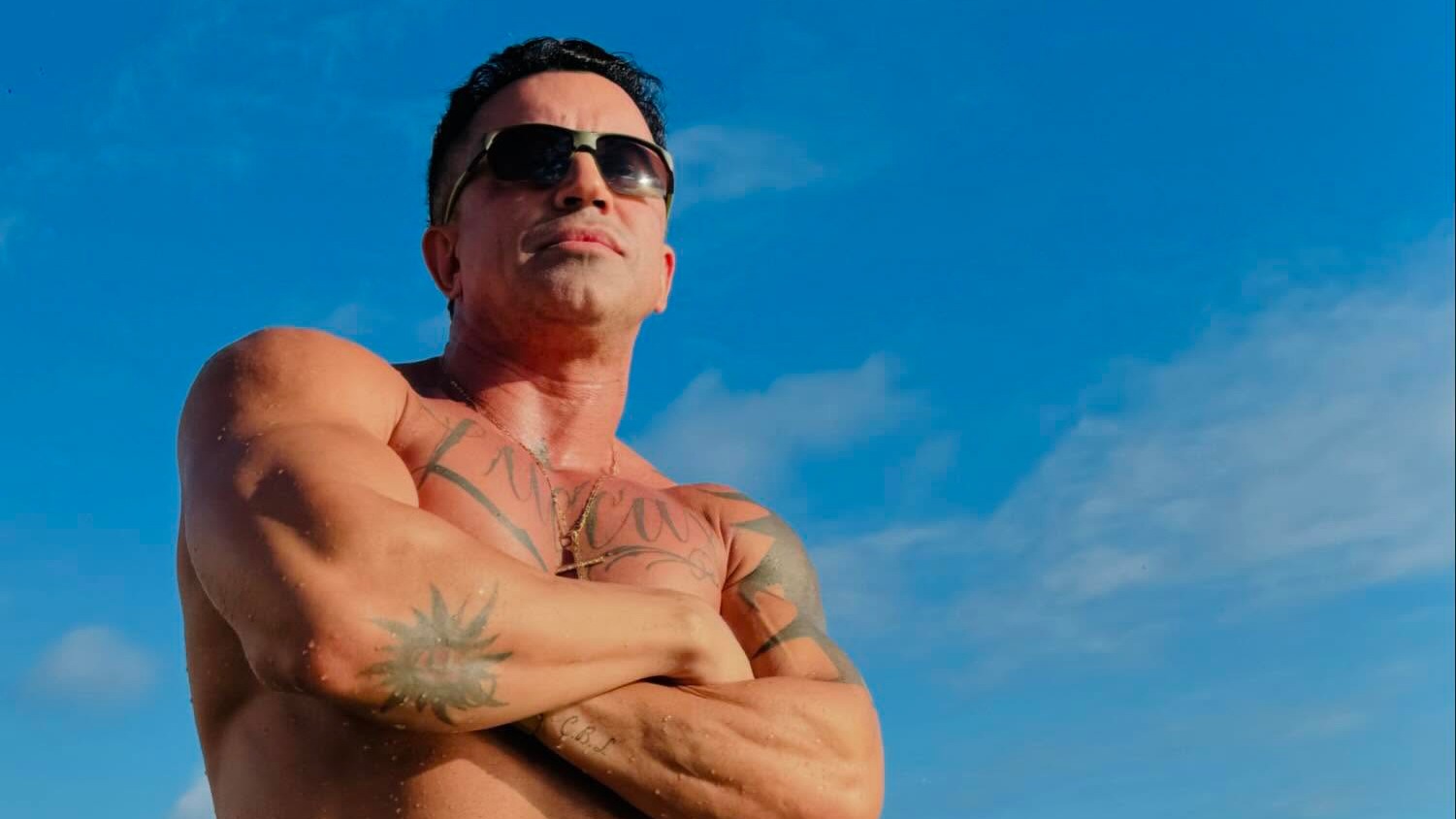
Behind the doors of a large, three-storey house in the gay epicentre of Rio de Janeiro’s Copacabana, five blocks from the famous beach, lies a sexual playground. In the 700-square-metre Point 202 sauna, half-naked men walk around wearing only towels. On the first floor, sofas and tables and around 30 screens are arranged in front of a stage where drag queens and go-go boys perform for an audience of male locals and tourists.
When owner Júnior Barbosa, 49, opened Point 202 sauna in 2002, his competitors were hostile. “At that time, the saunas in Copacabana didn’t want me to open here. I received several threats over the phone. I had to walk around with six bodyguards and [had] an armoured car,” recalls the muscular businessman when we meet at Point 202.
On one occasion, a West African offering — these often take the form of a clay pot containing an animal sacrifice such as a chicken which is surrounded by red or black candles — was left on the sauna doorstep to ask the deities to harm either Barbosa or to cause his business to fail.
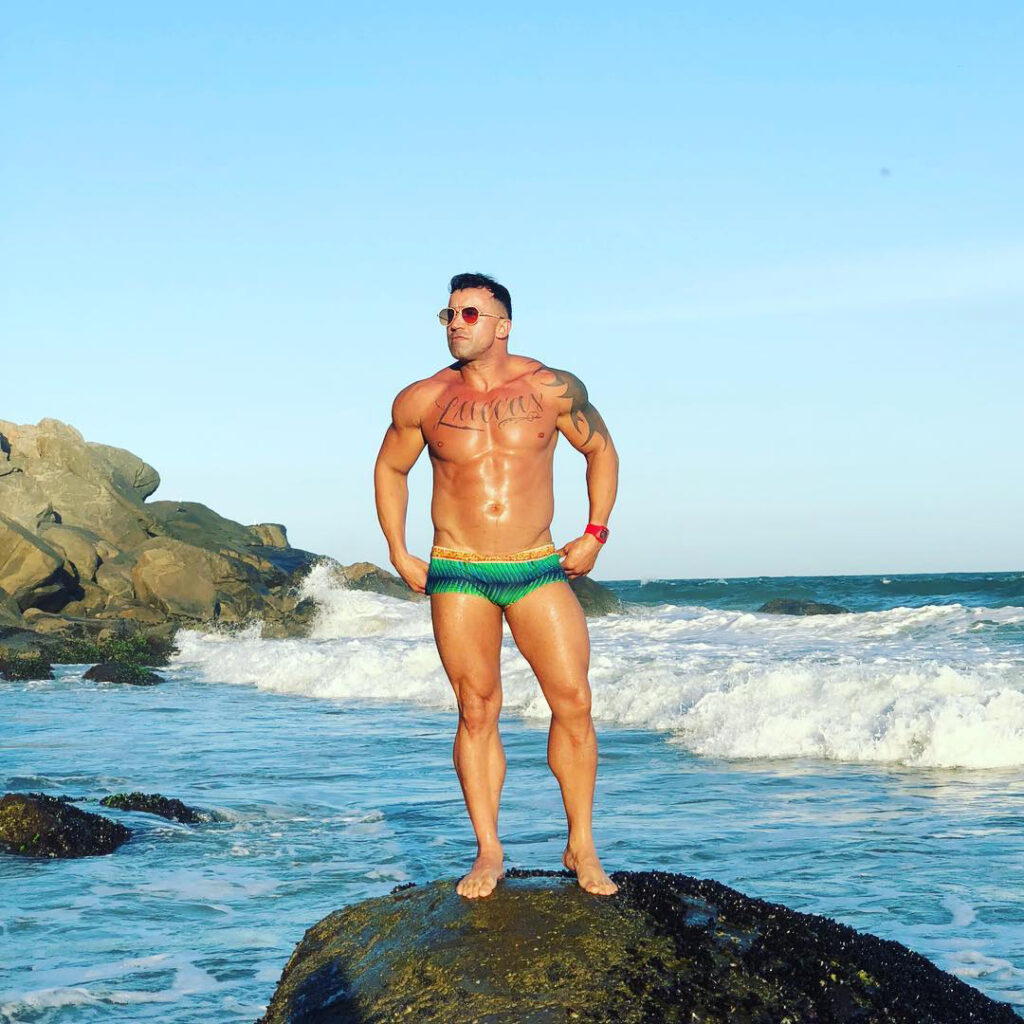
However, the intimidation didn’t frighten Barbosa, who would go on to reinvent Copacabana’s gay nightlife. He is proud of his achievements: he lives in a spacious flat in the neighbourhood, travels regularly overseas, and has used his success to improve the lives of his mother and five siblings. Although he was briefly married to a woman years ago and had a son, he identifies as gay. Currently single, Barbosa says he’s a happier man when he’s free. He enjoys travelling and working out — in fact, his only vanity is his body, he says. While his family understand Barbosa’s business, they are not familiar with the gay world. His story could have turned out so differently.
At the age of 14, Barbosa left his poverty-stricken life in Ceará, northeastern Brazil, where he was born, and travelled with his aunt to São Paulo, the country’s largest metropolis, in search of a better life. Their journey was exhausting and took weeks because the bus they were travelling on kept breaking down. “We didn’t have any money to eat on the road, so my mother had made a chicken and kept it in a tin for us to eat on the trip, but the food went [off], and I got sick and had to go to the hospital,” he says.
“I slept on the floor. I couldn’t go out; I was a slave”
Once in São Paulo, Barbosa lived with relatives who repeatedly verbally humiliated him as if they were annoyed by his presence. He worked various jobs and, two years later, he was tricked by a false promise of work in Rio de Janeiro. Then aged 16, he was held captive in a small flat and sexually exploited by pimps. “They were dangerous. All the money went to them. The food was bad. I slept on the floor. I couldn’t go out; I was a slave,” he says. Unable to leave the flat or call for help, he had no means of communicating with his family or the outside world.
Escaping sex trafficking was no easy task. The building he was kept in was a ‘vertical shantytown’, a slum with 540 small flats, many of which were brothels controlled by pimps and drug dealers. Eventually, after three months, Barbosa asked a client who had come to the flat for sexual services for help. The client called the police, who rescued Barbosa and arrested his pimps.
Afterwards, with nowhere to go, he lived on the street for a few months. Alone in Copacabana, he worked as a street vendor and often slept on the sand of the famous beach, using a backpack as a pillow: “You have to face it when you have no choices. I was a warrior; that’s why I’m here,” he says. At no point did he think about going back to his hometown.
“The idea came when I went to another sauna, and I noticed that it was very bad”
It didn’t take long for Barbosa to enter the street sex market, although this time it was his own choice. This period didn’t last long: “I was not good at it,” he admits. In order to survive, he worked several jobs at a time, such as food deliverer, salesman, car washer and cleaner, and also subleased the bedroom of the flat where he lived. His hard work paid off, and at the age of 19, he opened his first bar. A few years later, he decided to open a sauna.
“The idea came when I went to another sauna, and I noticed that it was very bad,” he says, referring to the condition of the place.
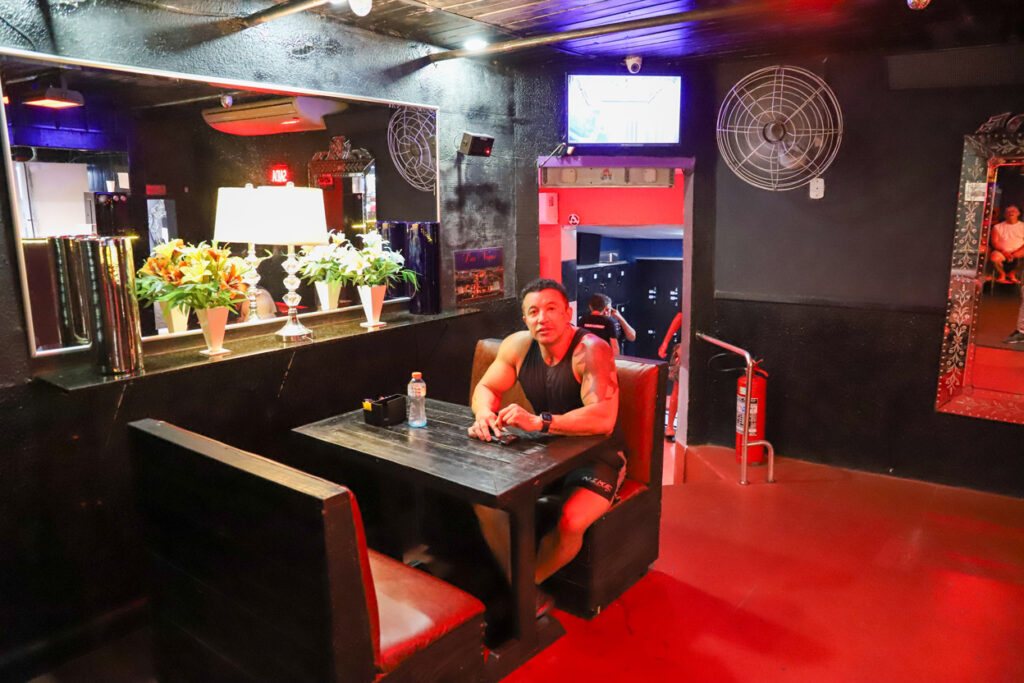
Gay life has always been a part of Copacabana, which is a popular destination with LGBTQ+ tourists. The first Brazilian Pride event took place on Copacabana Beach in 1995, organised by the International Lesbian, Gay, Bisexual, Trans and Intersex Association (ILGA). At the time, it didn’t attract a huge number of people, but it soon became an annual tradition, and today up to two million people attend.
By the mid-2000s, Barbosa had already burst the bubble of that small group of entrepreneurs who didn’t want a competitor in Rio. While Point 202 thrived, with queues often forming to get in, competitors gradually closed their doors. The ‘sauna mafia’ ran out of steam, and it didn’t take long for Barbosa’s 18-plus venture to become the only one in Copacabana, and the most popular in Rio de Janeiro. There are now around nine saunas in Rio, three of which — including Point 202 — offer rent boys.
In a pattern that was repeated around the world, the proliferation of hook-up apps in the 2000s changed gay Brazilian nightlife for good. In the past, the only way to meet someone was to go to cruising areas or clubs, but the apps removed the need for this. Between the 1970s and 1980s, there were around 50 nightclubs in Copacabana catering for either LGBTQ+ or straight clientele. In the 2000s, this number fell by more than half, and today there are no more than five.
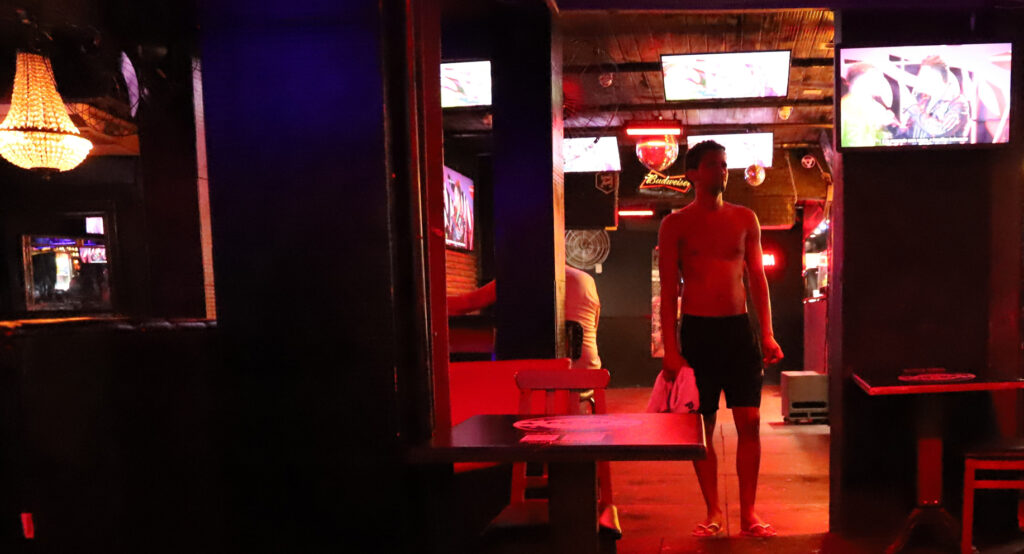
Barbosa proved his flair for business by taking advantage of this change. As nightclubs closed, he saw the opportunity to branch out, and became the first Rio sauna to put on drag queen shows, a move that was soon copied by rival businesses. This rescued the livelihoods of drag artists, who had seen their work drastically reduced as LGBTQ+ nightclubs closed. “The (drag) shows practically don’t exist anymore. I helped their job market, and mine too by offering more leisure to my audience,” says Barbosa.
Barbosa assures us that the virtual dating world hasn’t affected his business: “It’s actually improved, because the safety is in the sauna, whether it’s here or in another one. Sauna customers are more aware and don’t go looking for these apps — they’re more for younger guys, but there’s a high risk of being mugged or harmed.”
According to a report published on a Brazilian news portal last year, between March and August 2024, at least five gay men were killed after meeting through dating apps in Brazil. In addition, on social media there are dozens of victims who have shared stories of being lured by fake profiles and then robbed. It’s very likely that the actual crime rate is higher because many victims don’t report the crime to the police.
“Nowadays, the apps are dangerous,” says Barbosa, telling me how thugs pretend to be gay in order to go to the victim’s house. “When they get there, they coerce them, rob them, dope them and even kill them,” he says.
According to a survey by Grupo Gay da Bahia, an LGBTQ+ human rights association in Brazil, 118 violent deaths against gay men were recorded in Brazil in 2023. For this reason, many prefer to visit saunas because of the greater protection they offer, not only for the sex worker, but also for the provision of a place for a safer encounter.
At Point 202, rent boys aren’t hired. They just pay the entrance fee, and the money for their sexual services goes entirely to them, while the go-go boys are recruited just to strip. Everyone is instructed on the rules of the house. Drugs are banned, and mobile phones are forbidden. An exception has been made to take the photos that illustrate this article, and even then, we attend before peak visiting hours to ensure the discretion of the sauna’s rent boys and clients.
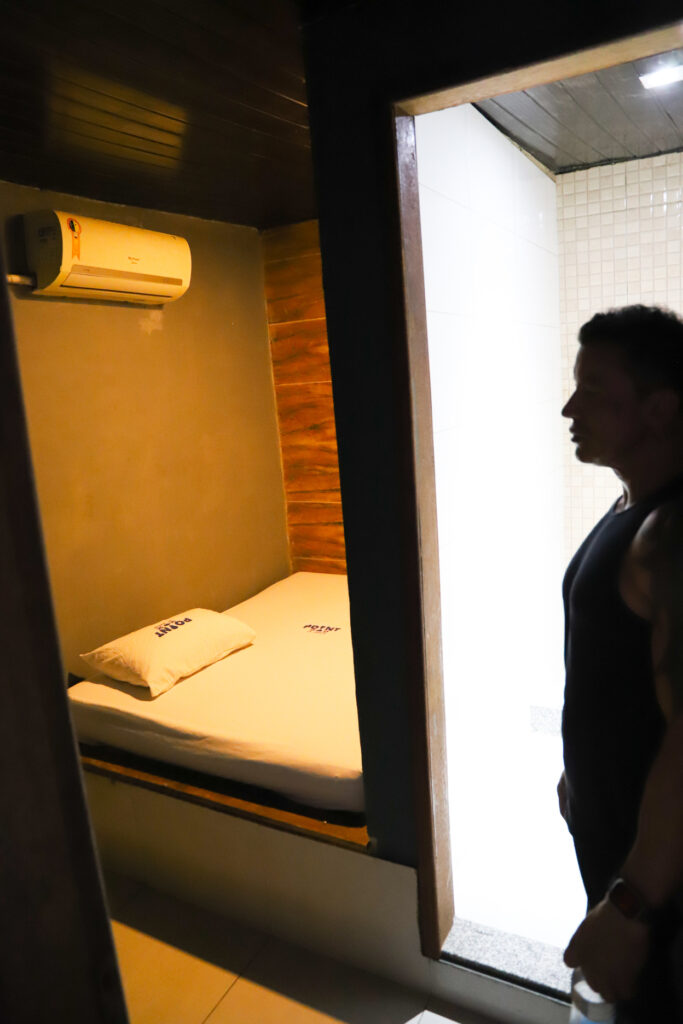
On a regular night, the customers are mostly middle-aged, and although sex is available, they are also looking for a place to socialise with friends, drink and watch the drag shows.
While drag queens get ready for their performance in the dressing room behind the stage, the rent boys circulate and chat with the patrons. Aged from 20 to 30, the rent boys are diverse in looks — they are white, Brown, or Black, with bodies ranging from slim to muscular. The one thing they all tend to have in common is that they are well endowed. Most of them avoid talking about their private lives and generally identify themselves as bisexual. Few speak English, which can make communication with foreigners difficult, or limited. Felipe (not his real name), a dark-haired 25-year-old, explains that they often mime or use hand gestures to facilitate conversation. Many of the guys that work at the sauna live with their families and have other day jobs. One of them, a young Black man, reveals that he works as a gym teacher. Some have girlfriends and are here to earn extra income.
During tonight’s performance, a drag queen lip-syncs to an old Brazilian song, and a man in the audience gets emotional and sings along. Another patron tells me that he prefers Point 202 because it’s the cleanest and biggest sauna in the city. But anyone who thinks that only mature men frequent the place is mistaken, insists Barbosa, adding that young people and all sorts of tourists make up the client base.
Looking to the future, Barbosa says that he intends to slow down when he turns 50. The plan is for his son, Luccas, who is now 24 and married with three children, to follow in his father’s footsteps and enter the sauna business.
Our conversation is interrupted as the go-go boys arrive on stage for the next show, dressed in the uniforms of different professions. After performing a sensual dance, they end the show naked — to cheers from the customers. It’s almost 11pm now and the place is full, and the next day more shows will take place, along with themed parties as Carnival season pulls in the crowds. For Barbosa, it’s business as usual — one happy customer at a time.
